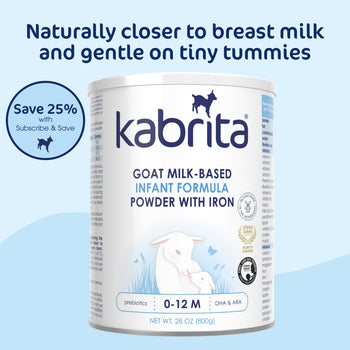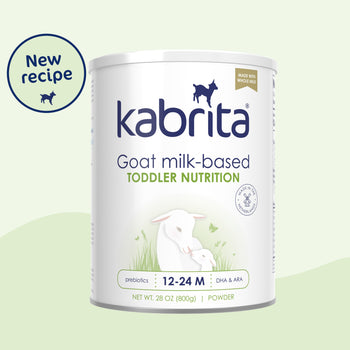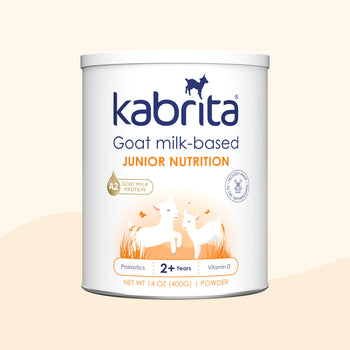Four Myths About Lactose Intolerance

Myth #1: Humans Are Not Meant To Consume Lactose
In breast milk, lactose is the primary carbohydrate, and babies consume and digest lactose from their mother’s milk. For many people, the ability to produce the lactase enzyme diminishes with age. So, while lactose intolerance may be more common in older children and adults, the American Academy of Pediatrics says that lactose intolerance in toddlers is uncommon before 2-3 years.
Truth: Lactose is in breast milk. In very young children, lactose intolerance is uncommon.
Myth #2: Lactose Differs Depending On The Source Of Milk
Lactose is molecularly identical regardless of source, meaning that breast milk lactose is the same as that found in both cow and goat’s milk. While the lactose molecule itself is the same, the amount of lactose in breast, cow, and goat’s milk will differ.
Truth: All lactose is created equal.
Myth #3: Baby Formula Should Be Lactose-Free
Carbohydrates are an essential energy source for babies. Since lactose is the primary carbohydrate found in breast milk, it is also the preferred carbohydrate source in baby formula. And, studies have shown that lactose may benefit the gut microbiome and help with the absorption of calcium.
Kabrita Goat Milk Toddler Formula uses lactose as the primary carbohydrate. Other carbohydrate sources sometimes used in different formulas may include maltodextrin, corn syrup, corn syrup solids, sucrose, or a combination of these.
A lactose-free formula, such as soy formula, may be necessary for children with rare, severe conditions such as congenital alactasia.
Truth: For most healthy babies, lactose is the preferred carbohydrate in baby formula.
Myth #4: Lactose is to Blame for Milk-Related Digestive Discomfort
While lactose is one possible cause of tummy troubles after consuming cow’s milk, it is not the only trigger. Cow milk sensitivity, where cow’s milk proteins may be difficult to digest, may also lead to similar digestive symptoms as lactose intolerance.
Truth: Cow’s milk sensitivity, not lactose intolerance, may be the cause of digestive discomfort for some individuals.
Lactose often gets a bad rap, but toddler lactose intolerance is uncommon and may not be to blame for symptoms related to cow’s milk. Since goat’s milk protein is gentle on tiny tummies, Kabrita Goat Milk Toddler Formula may be a solution for children with cow milk sensitivity or those avoiding cow’s milk. As always, it’s best to talk with your health professional before making feeding changes for your little one.
Kabrita Goat Milk Toddler Formula may be an option for little ones during feeding transitions, such as weaning and supplementing, or those with minor issues associated with cow milk sensitivity*.
*Not suitable for children with confirmed cow milk protein allergy



